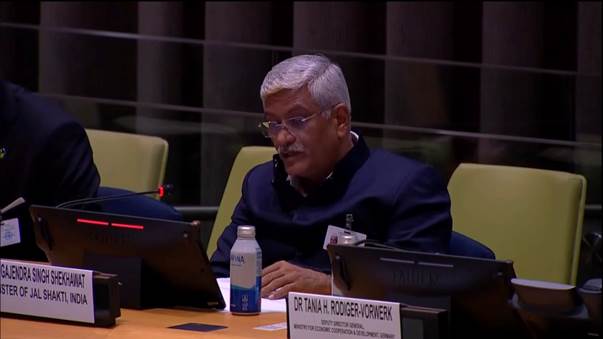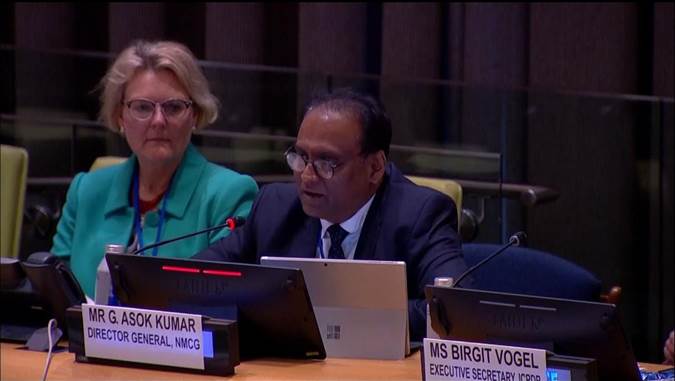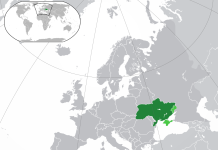
Union Jal Shakti Minister Delivers Keynote Address At Panel Discussion On Namami Gange At UN Water Conference In New York
NMCG Has Successfully Improved Water Quality And Biodiversity In River Ganga: Shri Gajendra Singh Shekhawat
By PIB Delhi
Union Minister of Jal Shakti, Shri Gajendra Singh Shekhawat delivered the keynote address at a panel discussion on ‘Namami Gange – an integrated and holistic approach towards conservation and rejuvenation of River Ganga and its ecosystem’ organised by National Mission for Clean Ganga (NMCG) during the UN Water Conference 2023 at United Nations Headquarter, New York on 23rd March 2023.
Delivering the keynote address, Shri Gajendra Singh Shekhawat asserted “NMCG has successfully created a robust sewerage treatment infrastructure across cities and towns along the Ganges resulting in improved water quality and biodiversity. The sightings of Gangetic Dolphin, Turtles and Hilsa fish have increased indicating the improved health.” He added that Namami Gange Mission was recognized as one of the world’s top 10 ecosystem restoration flagships at a function in the 15th Conference of Parties (COP15) to the Convention on Biodiversity (CBD) in Montreal, Canada on 14th December 2022, the World Restoration Day.
Shri Shekhawat said Ganga has a special place in Indian context as it is a holy and pristine river and caters to 43% of the population and form around 23% of the geographical area and Namami Gange Mission was launched in 2014 under the leadership of Prime Minister Shri Narendra Modi in view of the deteriorating health of River Ganga and its ecosystem due to urbanization on its banks. He stated “Namami Gange Mission was launched with a mandate and vision for restoring Nirmalta and Aviralta of River Ganga. Furthermore, the aim is to not just restore Ganga to its pristine glory, but also help the local population connect with its traditional wisdom,”.
Shri Shekhawat said that India has commitment investments of more than 240 billion dollars in the water sector and is also implementing the largest dam rehabilitation programme in the world as well as efforts to restore the groundwater situation in the country. Shri Shekhawat emphasized the importance of public participation in making Namami Gange a success and acknowledged the contribution of the local people living on the banks of the river, who came together to make the Namami Gange Programme a success. “With millions of people connecting and interacting with the riverine ecosystem, there has been a massive surge in awareness on river related issues,” he said.

Shri Shekhawat noted that in comparison to other river restoration programmes in the world including the Danube and Thames, NMCG was able to get positive results in Clean Ganga Mission in just 6-7 years. He acknowledged the role of international cooperation and partnerships India undertook and said the NMCG’s work is not just limited to restoration of rivers anymore, but to economically connect individuals to the river system to transform Namami Gange into a sustainable model through robust people-river connect, for generations to come. “Under the guidance of Prime Minister Shri Narendra Modi, the concept of Arth Ganga was espoused to give a new dimension towards connecting local communities to Ganga and its tributaries through activities that can sustain them economically,” he added.
H.E. Magnus Heunicke, Minister for Environment, Denmark remarked that water is of utmost importance for millions of people for their health, economy, ecosystem, biodiversity, culture, history, and religion. He spoke about the cooperation between India and Denmark on sustainable and reliable water and green agenda. “Water is a source of life, but it is also essential to the quality of life. Partnership with India is more than just technology, it is about cities, communities, access to clean water and creating a world that is better and more sustainable”, he noted.
He said that in 2020, India and Denmark joined forces to form a strategic partnership with water as one of the key pillars of the collaboration to ensure clean water for a growing population. With Denmark equipped with the best technology and adding new regulations to improve their water sector, he aimed to make Denmark climate neutral by 2030. He emphasized that with necessary technology, right framework conditions, and good partnerships, we can together recover from the emerging water crisis. He further said that good cooperation between government, businesses and especially, between countries is essential. To come up with new solutions and make our communities more resilient against effects of climate change, we need to come together and share our technologies.
Giving an overview of the Namami Gange Programme, Shri G. Asok Kumar, Director General, National Mission for Clean Ganga expressed his privilege to speak about one of India’s flagship programmes, which has now become one of the flagship programmes of the World. DG, NMCG mentioned the five important pillars of Namami Gange Programme – Nirmal Ganga (unpolluted river), Aviral Ganga (unrestricted flow), Jan Ganga (People’s Participation), Gyan Ganga (knowledge and research based interventions) and Arth Ganga (people-river connect through the bridge of economy). Shri Kumar informed the gathering that in the last 8 years, 183 sewerage infrastructure projects have been sanctioned to create treatment capacity of around 5658 Million Litres per Day (MLD) and lay around 5206 km of sewer network, out of which 105 projects have been completed creating a treatment capacity of around 2175 MLD and laying down around 4336 km of sewer network. Besides, India adopted innovations like Hybrid Annuity Mode (HAM) and One City One Operator (OCOP), which are being appreciated by the world. Shri Kumar said that under Namami Gange Programme good environment was created for the biodiversity to thrive which is manifested in increased sightings of Gangetic Dolphins at much cleaner stretches of the river.

Shri Kumar said that one of the most important factor in achieving success was whole-of-the-government approach insisted by the Prime Minister requiring cooperation among various Departments through convergence of funds, resources – financial, technical, experience, wisdom, manpower, and much more. Shri Kumar noted that the Jal Andolan became Jan Andolan with the involvement of individuals, community stakeholders, NGOs, international NGOs, panchayati raj institutions, local body institutions, startups and faith based organisations, which were essential since Ganga is an important river in the Indian tradition. He also mentioned that District Ganga Committees have been formulated to hold regular meetings under the chairmanship of the District Magistrates.
Shri Kumar said that under Namami Gange Programme, efforts are being made to build the capacity of the vendors, improve working conditions of labours on sites and develop national capacity of the finances of each project. NMCG encouraged innovations like HAM and OCOP, improved transparency, ensured closer monitoring and quick completion of projects.
DG, NMCG noted that in the last about 12-18 months, a paradigm shift has taken place from pipe-and-pumps approach to soft connect with people living on the banks of the river under Arth Ganga campaign. Natural Farming and Millet Farming is being promoted and fisheries and river ranching is being done to increase the number of aquatic species ultimately resulting in generating livelihood for local people. Livelihood models like Jalaj are being promoted through which local NGOs are motivated in taking up innovative activities like providing tourist guides, small river cruises, selling local products, rescuing dolphins etc. which is not only fostering river-people connect, but also improving the economic situation of the local communities involved.
DG, NMCG concluded his address by mentioning the initiative of River City Alliance signed up by 107 cities situated on the banks of the rivers and now trying to expand to international audience for twinning of rivers as well as twinning of cities. He said that international partnerships have helped India in a huge manner in achieving which seemed impossible and now NMCG plans to sustain it through people’s participation.
Mr. Saroj Jha, Global Head, Global Water Practice, World Bank outlined World Bank’s vision for massive challenge of river basin management and reviving the ecosystems around the world. He said that India provided a comprehensive institutional framework and brought all the components of government together, leading to success of the Namami Gange Mission. Innovations have been seen in terms of financing as seen in the Hybrid Annuity Model which attracts long-term financing.
He said that most of the river systems, particularly in developing countries, are polluted and have disappeared due to lack of ecosystem planning. He added that the World Bank is looking to incorporate their learnings from India into other countries to provide better solutions. As part of the focus on water resource management for climate adaptation for building resilience, he highlighted that the World Bank will be focusing on river basins for larger parts of the world on the basis of the model provided by India.
Furthermore, he noted the importance of integrated resource management and said that India offers a stellar example for it as seen in different aspects of water coming together under one ministry. As part of institutional and sectoral reform, he said that the World Bank wishes to take initiative that has clear focus on different components of water i.e. water supply, sanitation, irrigation, and water resource management, which will require comprehensive thinking into river basin management as it will help in storing water, preventing floods, coping with droughts, and creating economics around the river. He ended his address by remarking that India offers a great model in terms of how the World Bank can take forward in countries around the world.
Special Water Envoy, Netherland, Mr. Henk Ovink said that water is helpful and that by investing in it, we can add value to our economies. NMCG is an inspirational success story on how to address the challenge of water crisis. “NMCG is a beacon of hope”, he said, “By giving water sector the importance it deserves, we can achieve a healthy environment, justice in our society, opportunities for women and girls, resilient environment, curb biodiversity loss, and forge partnerships”. “Rivers don’t care where we put our borders. They flow, where they flow”. He hoped that partnerships can drive the capacity that we need to build a sustainable water system throughout the world.
Dr. Tania Vorwerk, German Federal Ministry for Economic Cooperation and Development (BMZ) spoke about the systematic organization problem that needs to be dealt with. She suggested a coalition of governments with the UN and World Bank all across the nations to work together on the water crisis. She said that there is an urgent need for a strong agenda, bold envoys advocating for system-wide approach and cooperation across nations. Namami Gange’s success, she noted, is essential for world’s development as it showed how cooperation at all levels of the government can help in resolving the water issue. Furthermore, she advocated for world-wide approach towards the water crisis to create a better ecosystem for generations to come.
Ms. Birgit Vogel, Executive Secretary, ICPDR said that large river basins like Ganga has different geographical and climatic conditions, histories, socio-economic situations, biotic and abiotic characteristics. However, similarities and co-relations with basins like Ganga, we need to make positive use of this for exchange and relationships between river basin organisations.
She highlighted the importance of exchange experiences as it places functional institutional setup operational mechanisms, improves river basin management and related approaches, climate change with respect to water quantity and drought, takes effective actions to improve situations in river basins, fosters cooperation to prevent tension and conflict about quantity and quality of water. She said that it’s about learning from each other and how to transform ineffective approaches to functioning ones. The exchange of sharing experience between river based organisations is of key importance, she noted. She concluded her address by calling for immediate and urgent solutions on climate change, drought and water scarcity.
A book titled “Ripples: India’s Sustainable Water Management Story” which covers ongoing efforts of Indian government to manage water in sustainable and equitable ways, and provides a snapshot of major policies, schemes and missions that India has adopted over the last 2 decades was also released during the session.
Other key panelists were Minister for Environment, Denmark, H.E. Magnus Heunicke, Director General, National Mission for Clean Ganga, Mr. G. Asok Kumar, Special Water Envoy, Netherland, Mr. Henk Ovink, Global Director, Global Water Practice, World Bank, Mr. Saroj Jha, Deputy Director, German Federal Ministry for Economic Cooperation and Development (BMZ), Dr. Tania Vorwerk and Executive Secretary, ICPDR, Ms. Birgit Vogel. Mr. D.P. Mathuria, Executive Director (Technical), NMCG moderated the event.



















